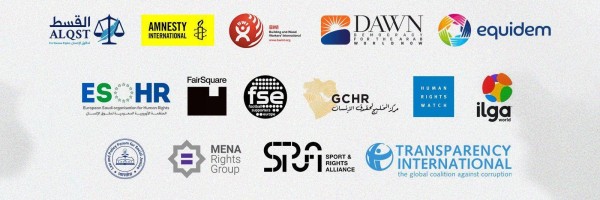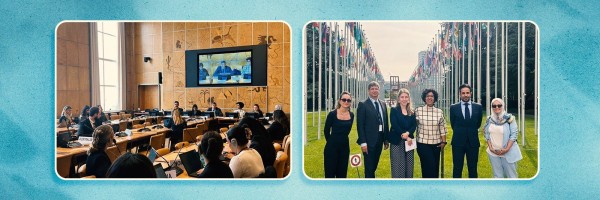A coalition of human rights NGOs including ALQST has drawn up a list of key recommendations in preparation for the fourth cycle of the United Nations’ Universal Periodic Review (UPR) of Saudi Arabia in 2024. At the UPR pre-session in Geneva on 1 December 2023 and during previous one-on-one meetings with diplomatic delegations, ALQST’s Head of Monitoring and Advocacy, Lina Alhathloul, and NGO partners put forward a range of urgent recommendations that they want UN member states to issue formally during the UPR to address the dire human rights situation in the country. Their recommendations range from the release of prisoners of conscience to abolition of the death penalty for minors, as well as a raft of legislative reforms.
The UPR pre-session provides an important platform for civil society to share its recommendations with UN member states ahead of the formal UPR process. If promoted by member states and accepted by Saudi Arabia, these recommendations have the potential to bring about significant change. Member states will issue their recommendations during the Human Rights Council (HRC) session in January 2024, and then in June-July the UPR adoption process takes place, during which Saudi Arabia accepts or rejects each of the recommendations.
Building on NGO reports submitted to the HRC for the UPR which document the deteriorating human rights situation in the kingdom, ALQST and its partners outlined a range of critical recommendations. These include calls to repeal or substantially amend the draconian Counter-Terrorism and Anti-Cybercrime Laws, and reform the State Security Presidency and Specialised Criminal Court, all of which operate to suppress freedom of expression and dissent by imposing lengthy prison sentences.
The NGOs demanded the immediate release of individuals detained for peacefully exercising their human rights, and called for an end to the practices of arbitrary detention, incommunicado detention, ill-treatment of prisoners, and reliance in court on confessions extracted under torture, as well as appropriate reparations for victims of human rights violations. The recommendations called for a moratorium on the death penalty with a view to its abolition, especially for non-lethal offences and for minors. Regarding land rights – particularly relevant as the state authorities press ahead with massive construction projects – ALQST and its partners advocated for the release of Huwaitat tribe members arrested for protesting forced eviction from their land, and for inclusive public consultation on all current and future development plans. They also called for laws including the Personal Status Law to be amended to remove all discrimination against women and completely abolish the male guardianship system, and demanded the lifting of travel bans on women human rights defenders released from prison, and the release of those still imprisoned.
ALQST’s Head of Monitoring and Advocacy Lina Alhathloul, returning from Geneva, commented: “Civil society has made clear its calls regarding human rights reforms. Now it is up to UN member states to formulate their recommendations in the UPR, and to the Saudi authorities to make genuine efforts to improve its record.”
ALQST and its partners urged diplomatic delegations to hold the Saudi authorities accountable for their human rights abuses, and press them to implement all these vital reforms. Since the last UPR which took place shortly after the state-sponsored murder of journalist Jamal Khashoggi, Crown Prince Mohammed bin Salman has enjoyed increasing diplomatic rehabilitation. This UPR presents a historic opportunity for member states to hold the Saudi authorities to account for their lack of meaningful reforms and human rights abuses.




